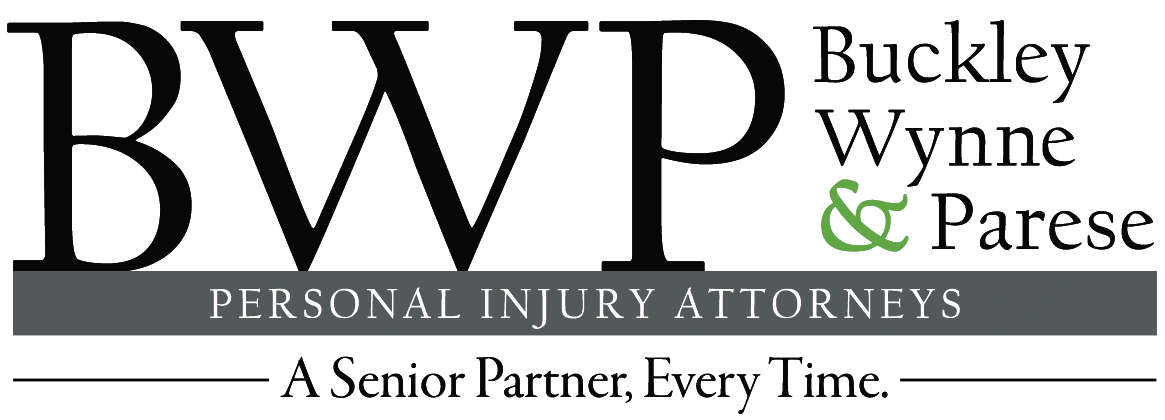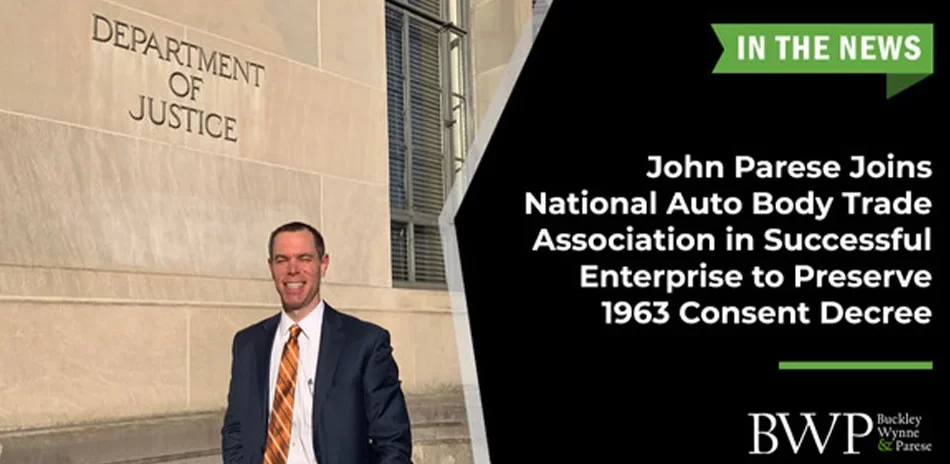John Parese, New Haven Attorney, Joins National Auto Body Trade Association in Successful Enterprise to Preserve 1963 Consent Decree
Attorney John Parese, senior partner at New Haven-based Buckley Wynne & Parese and General Counsel to the Auto Body Association of Connecticut (ABAC), proudly worked together with The Society of Collision Repair Specialists (SCRS) to help rescue the 1963 Consent Decree from the U.S. Department of Justice’s legal filing for termination.
Through its direct members and 40 affiliate associations, SCRS is comprised of 6,000 collision repair businesses and 58,500 specialized professionals who work with consumers and insurance companies to repair collision-damaged vehicles. Attorney Parese and the ABAC have had a long-standing relationship with the organization, so it was no surprise that Attorney Parese was consulted to help support the project.
What is the 1963 Consent Decree?
As many collision repair shops across the country know, the 1963 Consent Decree was originally drafted by then acting Attorney General, Robert F. Kennedy. It legally instructed 265 insurers and various other entities not to conspire to unreasonably restrain trade and commerce in the collision repair market.
Insurance companies insurers and co-conspirators were permanently barred from several practices, including “directing, advising or otherwise suggesting that any person or firm do business or refuse to do business with (a) any appraiser of damage to automotive vehicles with respect to the appraisal of such damage, or (b) any independent or dealer franchised automotive repair shop with respect to the repair of damage to automotive vehicles”.
The agreement between the insurance industry and the US government was to forever refrain from practices that were established as anti-competitive means of steering, price fixing and depressing and controlling automobile material damage repair costs.
April 2019: Deregulation Efforts Lead to Potential Termination of the 1963 Consent Decree
In April 2019, the U.S. DOJ sought to terminate the Decree along with nearly 1,300 other antitrust consent decrees. This was something the Trump administration sought to do as part of its larger goal of deregulation.
Appreciating the historical and contemporary significance of this Decree, SCRS and Attorney Parese swiftly went to work for the auto body industry. SCRS worked closely with key members of the House and Senate, conducting several small fly-ins allowing Members of Congress to hear directly from subject matter experts and collision repair shop owners in their districts, resulting in over a dozen letters and calls from Congressional leaders to the Justice Department.
The DOJ open comment period, which was extended specifically for comments on this Decree to October 2, 2019, also became one of the two most-commented-on Decrees of the 1300 proposed for termination.
Alongside the excellent grassroots response from SCRS members nationwide, SCRS and its representatives effectively communicated the very real concern that a rollback of the agreement would further embolden those prohibited behaviors (steering, price fixing and depressing and controlling automobile material damage repair costs) to the detriment of the citizens of our country who drive automobiles.
SCRS and its team, including Attorney Parese, successfully lobbied both Republican and Democratic senators and representatives, effectively convincing Congress and the DOJ that the Consent Decree was and remains a relevant consumer protection. The group also worked to convince interested parties that the Decree also reflected a vital prohibition on certain anticompetitive practices that were dangerous to consumers and harmful to the auto repair industry.
August 2020: 1963 Consent Decree is Preserved
In August 2020, the Society of Collision Repair Specialists (SCRS) received assurances from contacts in the US Department of Justice (DOJ) and Senate Judiciary Committee that the agreement in U.S. v. Association of Casualty and Surety Companies, et al (1963 Consent Decree) will be maintained, and the inquiry into the judgment is concluded and there are no plans to terminate the agreement.
This is a major victory for the auto body industry. The Auto Body Association of Connecticut, for which John Parese serves as legal counsel, was a big part of this success. This is a very exciting outcome after months of work.
Attorney Parese joins with SCRC in extending appreciation to the Justice Department for its thorough approach, and thoughtful deliberation, and to those members of congress that stood as champions to maintain consumer protections, especially Senator Richard Blumenthal, who has long advocated for greater fairness, transparency and enforcement of existing laws in the auto body repair industry.
John Parese, who maintains Martindale Hubbell AV Preeminent Rating with high ethical standing, currently serves as Legal Counsel for the Auto Body Association of Connecticut, and also serves as Legal Counsel and Consultant on Auto Body Laws and Practices.

Serving All of Connecticut
Free Evaluation 24/7
We understand the stress of dealing with an injury. Our team is here to provide compassionate support and effective legal representation, statewide.

